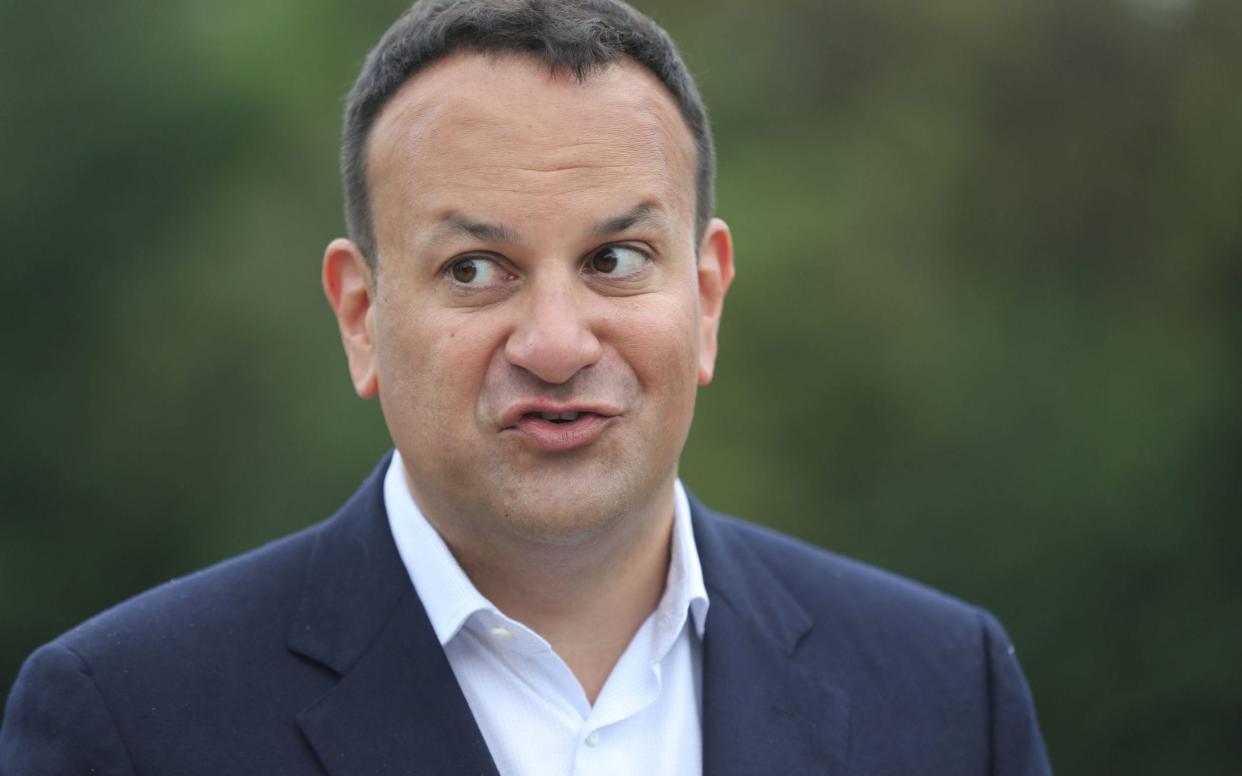Leo Varadkar accused of stoking tensions with ‘united Ireland’ comments

- Oops!Something went wrong.Please try again later.
Britain criticised Leo Varadkar on Wednesday after the Irish deputy prime minister said that a united Ireland could be achieved in his lifetime.
The former prime minister urged his Fine Gael party to work with a growing middle ground of voters in Northern Ireland to reunify the island, which was divided a century ago this year.
Mr Varadkar, who will take the top job in Irish government again next year under a coalition agreement, said at the annual Fine Gael party conference: "It is a legitimate political aspiration."
He said: "Unification must not be the annexation of Northern Ireland. It means something more, a new state designed together, a new constitution and one that reflects the diversity of a binational or multinational state in which almost a million people are British.
“Like the new South Africa, a rainbow nation, not just orange and green," he added.
Brandon Lewis, the Northern Ireland secretary, said that the comments were "ill-advised" and "unhelpful" in the House of Commons on Wednesday.
He urged all sides to "dial down the rhetoric", as Northern Ireland struggles with a burgeoning political crisis and turmoil caused by Brexit.
Mr Lewis later held talks with local leaders in an effort to bridge bitter divides over Irish language legislation that threatens to collapse the power-sharing government in Stormont.
The UK and Sinn Fein reached an agreement on the law at about 1am on Thursday morning. If no solution had been found before June 21, early elections would have been triggered.
Unionists criticised Mr Varadkar, 42, for adding to the tensions, which have been further stoked by British and EU clashes over the Irish Sea border.
Doug Beattie, the Ulster Unionist party leader, told the RTÉ broadcaster: "Good man, Leo, for bringing up Irish unity again when we are in a crisis."
Talks between Mr Varadkar and Boris Johnson were crucial in sealing the Brexit Withdrawal Agreement, which includes the Northern Ireland Protocol, in 2019.
Street protests
There have been loyalist street protests against the Protocol, which prevents a hard Irish border by introducing checks on goods from Britain and keeping Northern Ireland aligned to EU rules.
The EU has threatened Britain with trade tariffs if it unilaterally extends a grace period in the Protocol to ensure that British sausages can still be sold in Northern Irish shops from July 1.
Mr Johnson has vowed to act if he feels that the UK’s territorial integrity is at stake by triggering Article 16 of the Protocol, which Brussels warns would break international law.
The UK and EU have both accused each other of jeopardising the peace process and the Good Friday Agreement, as Northern Ireland braces itself for the start of the marching season.
The 1998 treaty that ended the Troubles states that the Secretary of State for Northern Ireland can call a referendum on Irish reunification if it appears "likely" a majority would back it. The Good Friday Agreement is unclear as to how the Secretary of State would judge public opinion.
Protestant majority
Both Ireland and Northern Ireland must support reunification in separate border polls for it to go ahead.
A poll for the Irish Independent newspaper showed that about 66 percent of Irish voters backed the move but only just more than a third of Northern Irish voters did.
Northern Ireland has historically been dominated by a protestant majority that identifies as British.
Academics predict that Catholics, who are more likely to support reunification and have closer ties to Ireland, will soon outnumber protestants in Northern Ireland. The threat of Scottish independence after Brexit is also sapping support for unionism, it is suggested.
Mr Varadkar said there was "no majority anymore" in Northern Ireland.
"There are three minorities: one that defines itself as British and Unionist, another as Irish and Nationalist, and a third and growing middle ground - many born since the Good Friday Agreement - who refuse to be defined in this way," he said.
He added that his centrist Fine Gael party should build its presence in Northern Ireland but not put candidates up for election there.

